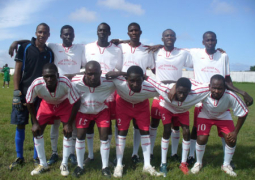Lend A Hand Society recently held a three-day training programme for advocates from different walks of life.
The advocates were drawn from schools and other institutions to take part in the training funded by the UNAIDS Banjul Office.
Addressing participants at the American Corner, Pamela Ann White, US Ambassador to The Gambia, said: “Africa today is on the verge of great change and is going to happen not because of your parents but you (the young people).
“So I give you a laid down responsibility to make your country better and you can do it and there are no doubts you can do it. You have been educated, strong and courageous; you have understood how to make good arguments, you make sure you know what change means, what and how you can grab the rules of change. I put this in your hands, it is your responsibility to make Africa better.”
Lamin Camara, Programme Officer at UNAIDS Office, deputizing the UNAIDS Banjul Office Coordinator Nuha Ceesay, told the young advocates: “At the UNAIDS we are very much proud to be associated with Lend A Hand Society in particular and young people in general.”
According to him, it is very important that they take the lead in response to HIV/AIDs because data show that 50% of those newly infected are young people as well as young women and girls.
He said that young people are the cream of the society; that is why at UNAIDS they always engage young people who are also vulnerable to HIV/AIDS.
“I want to assure you of our partnership and support at all times and our doors are open to support young people,” he said, urging the implementing partners to come out with result that would make a difference.
Mr Camara also told the young advocates to make the best use of the training for the rest of their lives.
For his part, Ahmed Jegan Loum, President of the Network Aid Services Organisation, which is the umbrella body of 25 NGOs and CSOs, told the gathering that 50% of aids reported cases are transmitted through unprotected sex, adding that the most infectious are the young people as they are sexually active.
He attributed this problem to poverty and economic inequity, lack of education among women, low access to sexual and reproductive health; because in some country there is an age limit before one can access sexual and reproductive health education. He also said women are facing a problem of violence against them. “So all these factors put them at risk,” he said.
“We are partnering with Land A Hand Society although the UNAIDS provides the funds, and my organisation, NASO, is distributing the funds. We have good relation with LAHS,” he concluded.
Muhammed Njie, the National Coordinator of Lend A Hand, said: “The Land A Hand Society is implementing a project funded by UNAIDS and we are implementing it together with other organisations up till December this year.”
He said that among their first activities are trainings, which target participants from different institutions including the press and schools.
Mr Njie noted: “The theme of the training is leadership and HIV/AIDS because these are key issues in Africa. There will be series of training where we will be equipping young people with required skills when it comes to leadership and HIV/AIDS.
“The project aim is to accelerate and make information available to young people. Community outreach programmes and radio talk shows are all parts of the project.”
He said his organisation is a grassroots-based organisation. “Since our inception in 1995 we have been operating on triangular mandate sponsoring schoolchildren, helping young people, as swell as building capacities for nation building.”


